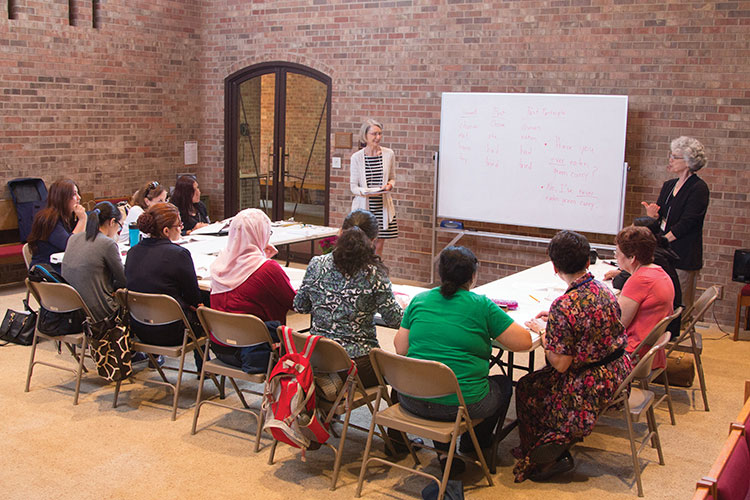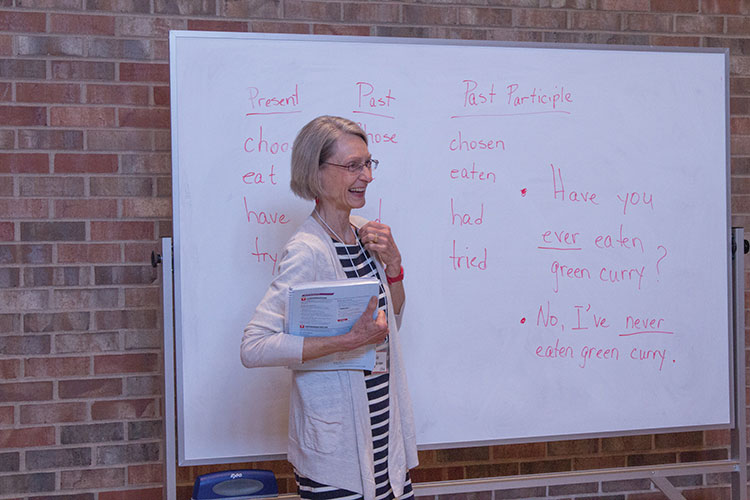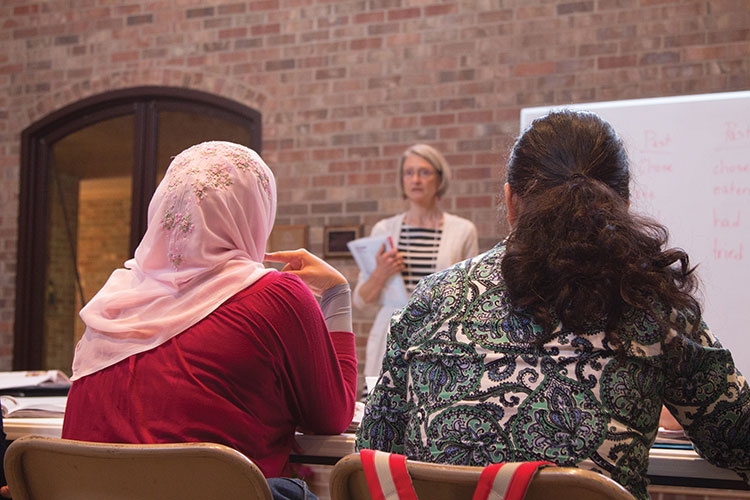| 2015 Q2 | story by LIZ WESLANDER | photos by STEVEN HERTZOG |

Sally Dickinson (left) and Jane Imber teach class.
Globalization is the defining feature of the modern world. Now more than ever, the social, political, economic and environmental issues that affect one nation affect the entire globe.
While the effects of globalization may be more subtle in Lawrence than in other places, an increasing international and immigrant population mean that both the University of Kansas and several local organizations are working to embrace the educational opportunities and challenges that an increasingly diverse population presents.
KU has been bringing international students to Lawrence for decades and is currently in what KU’s Director of International Student Services Charles Olcese calls a very aggressive growth mode in terms of recruiting even more international students to the university. Olcese said that the desire to increase KU’s international student population is a response to both globalization and to the changing demographics of the state.
“Higher education is recognizing that students need to be prepared to work in professional atmospheres that are more international and more diverse,” Oclese said. “Also as the population of 18-22 year-olds continues to shrink in Kansas, the university is looking to recruit more students from other states as well as internationally.”
The centerpiece of the university’s plan to attract more international students is a newly launched first-year experience program for international students called the KU Academic Accelerator Program (KUAAP). The program is a collaboration between KU and the Cambridge, Massachusetts-based company Shorelight Education, which offers incoming international freshmen small classes, cultural field trips, extensive support services and English-language instruction. Oclese said the hope is that this program will help increase both the number and the diversity of the university’s international student body.
“We realized that while we had a healthy international student population, it was concentrated in just a few countries,” Oclese said. “This will help us in further diversifying and increasing enrollment from places like Latin America, places in Asia that we haven’t touched and Africa.”
In the spring of 2015, there were 2,145 international students enrolled at KU accounting for 9.3 percent of the total student population. International students were divided evenly between undergraduate and graduate programs. Although there are about 100 nationalities represented among the KU international student population, students from China far outnumber other countries with 781 Chinese students studying at KU this spring. Other countries with more than 100 students at KU this spring included India with 253 students, Saudi Arabia with 169 and Korea with 109.
“We’ve had a large number of students coming to us from China since about 2005,” Oclese said. “If you look at any major university in the U.S., you’ll see China represented by a large margin. China has a rising middle class and has a lot of students that they cannot accommodate.”
The university understands that an increased international population comes with both advantages and challenges for the KU and Lawrence community. Oclese said that both the university and the Lawrence community have great a volunteer network that work to address needs and help international students feel welcome.
One area that presents a potential challenge, Oclese said, is the impending demolition of KU’s Stouffer Place Apartments. Stouffer Place was an affordable housing option designed for graduate students, non-traditional students and students with families and has traditionally served as a hub for networking and community building among international students.

Sally Dickinson teaching class.
“As we look at increasing the international student population, we are trying to measure and address how the community receives these students and asking ourselves how we prepare campus and how we prepare the community,” Oclese said. “We will be looking at ways to pull these groups together. Track where they will be living and help them network. It’s an exciting time and we feel like it’s a positive thing.”
One local non-profit organization, Small World, has been working to address some of the needs of Lawrence’s international community for 47 years. Small World provides affordable English classes, exclusively for women, two mornings a week during the academic year. The organization was founded in 1968 by a small group of Lawrence women who had lived in foreign countries with their husbands who were on sabbatical leave. Having felt the loneliness of living in a foreign country where they did not speak the language, these local women established Small World as social club for wives of international students.
During its first 20 years, Small World focused on domestic activities such as cooking, sewing and crafts, while also providing basic English classes. In 1990, Small World restructured to an academic focus, and now teaches six different levels of English classes to about 140 students a year.
“I think Small World would have died on the vine had we not made that change,” said Small World Director Kathy Mulinazzi. “When it’s 20 degrees outside, it’s hard to get someone who comes from a country with a warm climate out of the house for crochet.”
Mulinazzi said that the ethnic make up of the Small World has varied over the years depending on the world political climate.
“When I first came to Small World, the majority of the students were Tawainese , Korean and Japanese,” she said. “Today, we have a lot of students from China, Saudia Arabia and Mexico, as well as Iran and Iraq.”
About 80 percent of Small World students are family members of people affiliated with KU, said Mulinazzi. The other 20 percent are people who have immigrated to Lawrence – usually from Mexico. Small World classes are held at First Presbyterian Church on Clinton Parkway, but are not religiously affiliated. Mulinazzi said that Small World continues to serve only women because there are many women in the program from cultures where women do not attend school with men for religious reasons.
Another organization working to meet the education needs of Lawrence’s international and immigrant population are the schools of USD 497. Four of Lawrence’s elementary schools, Hillcrest; Cordley; Schwegler and Sunflower, have teachers who are endorsed to teach English Language Learners (ELL), as do all four middle schools, and both high schools. In May of 2015, there were 945 students enrolled in LPS that speak a first language other than English in their household. While 59 different languages are represented in USD 497 ELL population, the languages most spoken are Spanish (42%) with Arabic, Chinese and Laotian following in percentage. In all ELL schools, Spanish language is the most spoken with the exception of Sunflower, which has slightly more ELL students speaking Arabic than Spanish.
The Plymouth Language Program, like other local organizations, is cognizant of the challenges and opportunities that come with an increasing international community in Lawrence, but is unique in that it attempts to address the educational needs of the whole community by offering free English classes, affordable Spanish classes and multicultural education.

Small World Students
The Plymouth Language Program started in 2009 by Plymouth Congregational Church at 925 Vermont Street. Plymouth Language Program Director Joshua Spain said the program serves about 80 students a year and the program’s students are divided evenly between students studying English and students studying Spanish. Trained volunteers teach language classes on Tuesday and Thursday evenings. While some of the program’s English students have relatives affiliated with KU, Spain said about 40 percent of the English learners are immigrants from Latin America.
In addition to language instruction, the Plymouth Language Program works to foster multiculturalism in the Lawrence community by giving all of its students a chance to socialize via conversation groups and regular fiestas. Spain said that these events provide a chance for people of various cultures to talk and listen to each other in an environment where everyone is on equal footing. The hope is that participants will not only learn about other cultures, but also gain insights on their own culture.
“There are opportunities for mutual growth when it comes to multiculturalism,” Spain said. “When you encounter someone from another culture, it allows you some objectivity in looking at your own culture. It allows you to critically examine and understand why we do, and don’t do, things a certain way.”
Spain said he has found that people in Lawrence are often surprised to learn that the city has significant international and immigrant populations. He said this is partly because international enclaves are highly concentrated in certain areas of Lawrence, a phenomenon that concerns him because of the potential for immigrant communities to become isolated.
“If you go out to 25th and Ousdahl, or shop at Checkers, or spend time south of 23rd Street you will begin to see these people,” Spain said. “This is really unfortunate because it follows a pattern of a lot of other towns and cities where you have ghettoized communities of immigrants in one place and white middle class suburbs in another and never the twain shall meet.”
In an effort to provide further opportunities to explore the themes of citizenship and multiculturalism, the Plymouth Language Program also recently started a series of Monday evening workshops where students enrolled in their English classes can delve into subjects such as civics, health, employment and managing the stress of adjusting to an unfamiliar culture. Workshops for students in Spanish classes focus on the theme of global citizenship and include discussions on topics such as pandemics, terrorism, race and ethnicity, the United Nations Security Council and the World Health Organization.
“Because of globalization, issues today are not confined to political borders,” Spain said. “Working with people from other nations and other cultures to confront global issues is more important than ever and is going to become increasingly important.”

5 Comments
When someone writes an post he/she retains the plan ofa user in his/her brain that how a user can know it.Thus that’s why this post is amazing. Thanks!
Way cool! Some very valid points! I appreciate you writing this post plus the rest of
the site is also very good.
I truly love your blog.. Very nice colors & theme.
Did you create this site yourself? Please reply back as I’m trying to create my own blog and would like to know where you
got this from or what the theme is called. Kudos!
Yes! Finally something about Владивосток 2023 экономикалық форумы.
You are so interesting! I don’t believe I’ve truly read through a single
thing like this before. So great to find somebody with genuine thoughts on this topic.
Really.. thank you for starting this up. This web site is something that is needed on the internet, someone with some originality!